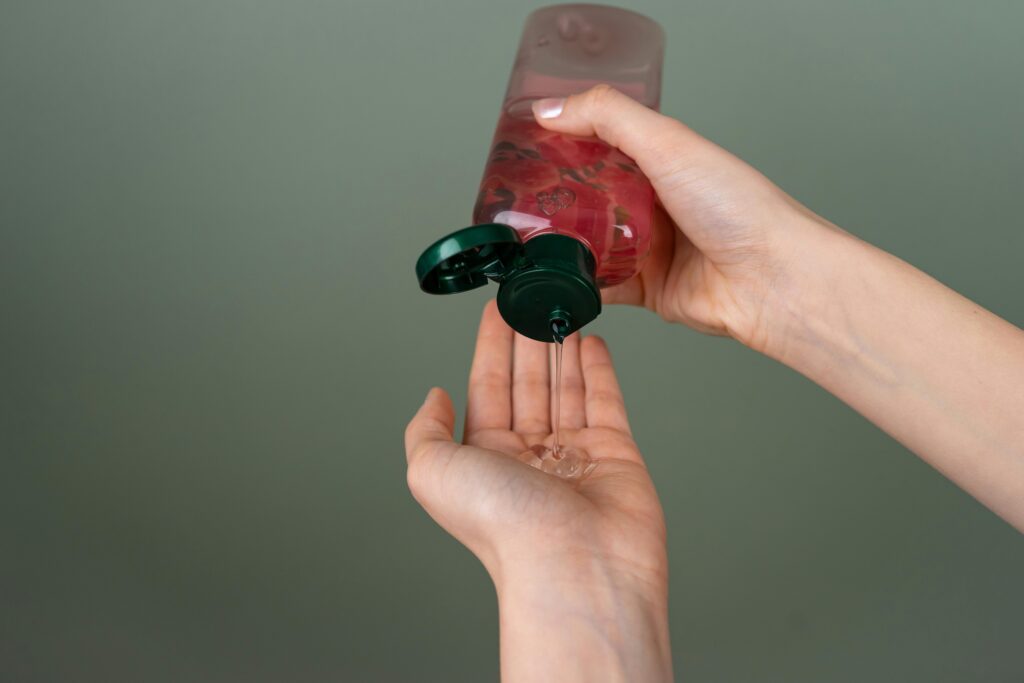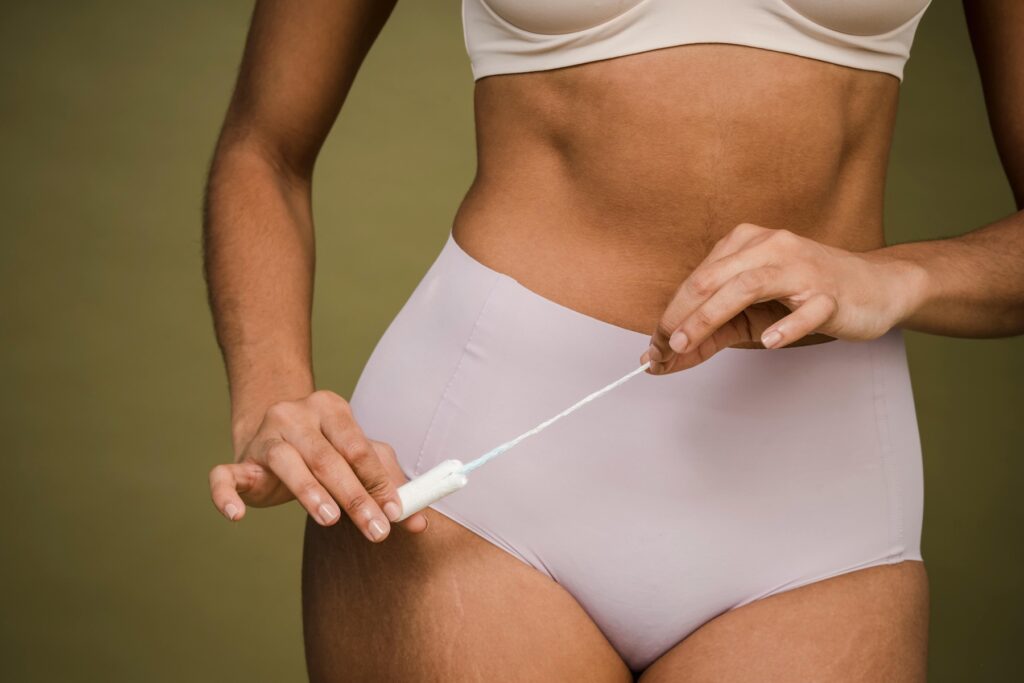Maintaining good vaginal health is crucial for a woman’s overall wellbeing, but many everyday habits can disrupt the delicate female balance. These 10 common habits can make it more difficult to improve vaginal health.
Your Cheat Sheet
- Smoking can disrupt the balance of bacteria in the vagina, increasing the risk of infections.
- Underwear made from synthetic materials can trap moisture, creating an ideal environment for bacterial growth and yeast infections.
- Scented products can upset the delicate pH balance and potentially cause inflammation, dryness.
- Excessive alcohol consumption can lead to dehydration, making it easier for infections to occur.
- Douching is not necessary and can upset the natural balance of vaginal flora.
- Not urinating after sex can increase the risk of urinary tract infections.
Drinking Alcohol
Drinking alcohol can be fun, but it can also affect your vaginal health. When women drink regularly, they might notice changes in their bodies.
4 Ways Alcohol Can Harm Women’s Health
- Increases Yeast Growth
Alcohol contains yeast and sugar. The sugar in alcohol can create a favorable environment for yeast, potentially leading to yeast infections. High blood sugar levels can cause an imbalance in vaginal flora, making yeast overgrowth more likely.
- Affects pH Balance
Alcohol can disrupt the vaginal pH by impacting immunity, which can lead to bacterial imbalances. This can make you more prone to the risk of bacterial vaginosis (BV) and other infections.
- Dehydrates Tissues
As alcohol is dehydrating, one of the biggest issues is that alcohol can lead to less vaginal lubrication. This can lead to vaginal dryness or irritation and make sex uncomfortable or even painful.
- Weakens Immunity
Regular alcohol intake can weaken immune function, which makes it harder for the body to fight off infections, including those affecting the vaginal area.
Alcohol can negatively impact vaginal health. Consider reducing your alcohol intake and saving it for special occasions. If you notice any symptoms of vaginal discomfort, it’s best to cut alcohol consumption entirely.
Wearing Non-Breathable Underwear
When it comes to vaginal issues, there’s a general rule – Women should opt for breathable cotton underwear that lets the vagina “breathe.”
A study by the American College of Obstetricians and Gynecologists found that synthetic materials like nylon, polyester, and spandex do not allow for proper airflow and can trap moisture, creating an ideal environment for bacterial growth and yeast infections.
Also, tight clothes can create friction and trap moisture, leading to discomfort and potential infections.
3 Tips for Choosing the Right Underwear
Here are some key points to consider:
- Breathability is crucial: Choose fabrics that allow air circulation, such as cotton, to help keep the area dry.
- Avoid excessive pressure: Tight pants can compress nerves in the pelvic area, leading to pain and discomfort. This is particularly concerning for women who already have sensitive areas.
- Opt for looser fits: Instead of tight leggings or jeans, consider wearing looser clothing during workouts or throughout the day.
Douching

Despite widespread belief, douching is actually not recommended for vaginal health. The vagina is self-cleaning and does not require special cleansers or rinses. Experts universally advise against douching.
Alisa Pascale, a women’s health nurse practitioner at Harvard-affiliated Massachusetts General Hospital’s Vulvar and Vaginal Disorders Clinic, explains that we don’t need virtually any of the products marketed for “vulvar health”. “Don’t use feminine wipes, powders, creams, or other over-the-counter products, even those that say they’re meant for the vulva,” she says.
Douching can disrupt the natural balance of bacteria in the vagina. This can lead to infections and other health issues.
Risks of Douching
It washes away good bacteria. The vagina has a natural defense system, and douching can remove beneficial bacteria like lactobacillus.
It can cause irritation. Many douching products contain harsh chemicals that can irritate the sensitive vaginal area.
It may lead to infections. Disrupting the natural balance can increase the risk of bacterial vaginosis and yeast infections.
Remember, the vagina is self-cleaning. It doesn’t need extra products to stay healthy. Just use water for cleaning, and you’ll be fine!
Excessive Use of Scented Products
Scented tampons, pads and wipes sound appealing? Actually research shows the added fragrances can be irritating.
Many women report unpleasant vaginal smell at different stages of life, and in most cases, there is no serious underlying issue. It’s tempting to mask the smell with fragrances, but this can actually make things worse.
Studies have found that up to 30% of women experience irritation from scented products. Scented products can upset the delicate pH balance and potentially cause inflammation, dryness, and even urinary tract infections.
Research has found that chemicals in menstrual products can even impact women’s reproductive health.
5 Tips For Choosing Tampons and Pads

You should look for:
Unscented Products: Fragrances can disrupt the natural flora. Unscented, hypoallergenic options are best as they reduce the risk of irritation and help maintain a healthy pH balance.
Organic and Chemical-Free Materials: Look for products made from 100% organic cotton or other natural materials, free from pesticides, bleach, or chlorine.
Breathable Design: Choose pads with breathable layers and tampons with applicators that allow airflow, helping to reduce moisture buildup and lower the risk of infections.
Appropriate Absorbency: Use the lowest absorbency needed for your flow (light, regular, super) to prevent dryness and irritation. Overly absorbent products can disrupt natural moisture and lead to discomfort.
Eco-Friendly Options: Consider biodegradable or reusable products, such as organic cotton pads, menstrual cups, or cloth pads. These can be gentler on sensitive skin and are often free from synthetic materials.
Not Urinating After Sex

It’s often advised to empty your bladder after intimacy. Is it really necessary?
It isn’t necessary but it is helpful. Peeing after sex may help prevent urinary tract infections (UTIs).
UTIs occur when bacteria enter the urinary tract and travel to your bladder. When you have sex, bacteria can be pushed into the urethra. Peeing after sex can help flush bacteria that was introduced during intercourse away from your urethra.
Experts still debate whether urinating after sex helps prevent UTIs, but some evidence suggests that urinating after sex may help prevent urinary tract infections.
Make it a simple routine, it’s an easy step that could help prevent an uncomfortable infection.
Eating Too Much Sugar
Foods like sodas, candies, ice cream, chocolate are high in sugar. Sugar can create a favorable environment for yeast, potentially leading to yeast infections.
High sugar intake can lead to inflammation in your body. This inflammation can weaken your immune system, making it harder for you to fight off infections.
Smoking
Smoking is not just bad for your lungs – it can also harm your vaginal health. When you smoke, the chemicals and toxic ingredients in cigarettes can disrupt the natural bacteria in your vagina.
Smoking can further reduce blood flow, which is essential for healthy tissue and can impact your overall vaginal health.
Smoking has been linked to increased risk of vaginal infections.
According to a study published in BMC Infectious Diseases, smokers have a lower proportion of vaginal Lactobacillus spp. compared to non-smokers. Therefore smokers might have a higher risk of developing infections. As smoking affects vaginal flora, research shows that it increases the odds of developing bacterial vaginosis.
Another research indicates that smokers are more likely to develop a yeast infection (candidadis) compared to non-smokers.
Excessive smoking can progressively mess your vaginal balance up. So to improve your vaginal health, it’s best to limit or avoid this habit.
Not Changing Pads/Tampons Frequently
Infrequent changing of feminine hygiene products like pads and tampons regularly during menstruation can allow bacteria to grow and increase the risk of infection.
Bacteria can grow in used pads or tampons, leading to infections. Plus, old pads or tampons can cause unpleasant smells.
Experts recommend changing tampons every 4-8 hours and pads every 4-6 hours. The U.S. Food and Drug Administration (FDA) advises never to wear a single tampon for more than 8 hours at a time.
Eating Fatty Foods
When you eat foods that lack essential nutrients, it can lead to problems down there.
Research suggests that a high intake of saturated fat may raise vaginal pH levels, increasing the risk of bacterial vaginosis (BV).
Here are popular foods high in saturated fat that you should be cautious about:
- Fatty cuts of meat (like bacon and sausage)
- Full-fat dairy products (such as cheese and cream)
- Fried foods (such as nuggets or fried chicken)
A healthy diet for vaginal health consists of probiotic-rich options like yogurt and kefir, along with leafy greens, as they help maintain a healthy balance of bacteria.
Nutrient-rich foods provide essential vitamins, minerals, and probiotics that help maintain the balance of good bacteria and improve vaginal health.
Ignoring Symptoms
If you notice any unusual changes, it’s important to pay attention. Symptoms like itching, burning, or unusual discharge can be signs of infections or other health problems.
Key Signs to Watch For
| Symptom | Possible Condition |
| Itching | Yeast infection or Bacterial vaginosis (BV) |
| Burning sensation | Urinary tract infection (UTI) |
| Unusual discharge | Bacterial vaginosis (BV) |
If you experience any of these symptoms, it’s crucial to consult a healthcare professional. One or several symptoms may also indicate a more serious vaginal infection, sexually transmitted infection (SDI) or illness.
Waiting for symptoms to go away on their own can lead to complications. Regular check-ups and being aware of your body can help you maintain good health and prevent issues from escalating.
Frequently Asked Questions
What are the effects of smoking on vaginal health?
Smoking can harm your vaginal health by disrupting the balance of good bacteria. This can lead to infections and other issues.
How does alcohol consumption affect vaginal health?
Drinking alcohol can cause inflammation and upset the balance of bacteria in your body, making it easier for infections to occur.
Is douching necessary for vaginal hygiene?
No, douching is not needed. The vagina cleans itself naturally, and douching can actually cause more harm than good.
How often should I change my pads or tampons during period?
You should change pads or tampons every 4 to 8 hours to keep the area clean and reduce the risk of infections.
Why is it important to urinate after sex?
Urinating after sex helps flush out bacteria that may have entered the urethra, reducing the risk of urinary tract infections (UTIs).
What foods should I avoid for better vaginal health?
Try to limit sugary foods and those high in saturated fats, as they can disrupt the balance of bacteria and lead to infections.
Bottom Line
Many everyday habits can unintentionally harm your delicate vaginal balance. It’s important to pay attention to how our lifestyle habits affect our health.
Maintaining a healthy lifestyle and diet, good hygiene, choosing breathable fabrics, and avoiding unnecessary irritants can improve vaginal health. If persistent problems arise, consulting a gynecologist is recommended.
TL;DR
- Smoking can disrupt the balance of bacteria in the vagina, increasing the risk of infections.
- Underwear made from synthetic materials can trap moisture, creating an environment for bacterial growth and yeast infections.
- Scented products can upset the delicate pH balance and potentially cause inflammation, dryness.
- Excessive alcohol consumption can lead to dehydration, making it easier for infections to occur.
- Douching is not necessary and can upset the natural balance of vaginal flora.
- Not urinating after sex can increase the risk of urinary tract infections.



